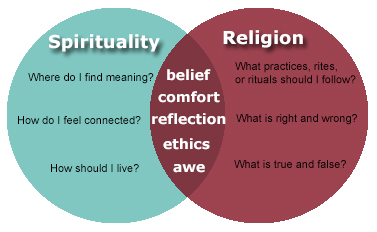

Is CEStoism a philosophical worldview or a religious worldview, or a spirtual worldview?
![]()
...[R]eligion always refers to a specific set of beliefs, i.e. Christianity, Islam, Buddhism, etc.
The term philosophy can be used in two senses: In the general sense it refers to 'the rational investigation of the truths and principles of being, knowledge, or conduct.' (source↗). In a narrower sense, you can use the word to refer to a specific set of philosophical theories, such as stoic philosophy or Kantian philosophy. It would be these narrower subsets of philosophy which might be considered parallel to a particular set of religious beliefs. ...
How do you make the distinction between philosophy and religion?
Answer: philosophy in general is the rational investigation of truth, whereas religion often makes the same kind of truth claims but doesn't claim to base it on reason or rationality, but instead it is based on other things like faith. The key difference is that they are different epistemological positions — philosophy has a system of logical principles in place to arrive at conclusions whereas many religions (such as Christianity) allow for other sources of knowledge (i.e. faith).
Are there some philosophies/religions that are hard to categorize as being one or the other?
Answer: In principle, it could be a problem to categorize them but in practice it is not very difficult. Why? Because virtually all religions with even a modest following carry with it a set of traditions and rituals which philosophies do not. Put simply, religions have practices and philosophies do not. Theoretically, you could have what might be considered a religion without any practices, but it's not very common.
![]()
![]()
William James, the pioneering psychologist and philosopher, defined religion as a belief that the world has an unseen order, coupled with the desire to live in harmony with that order. In his 1902 book The Varieties of Religious Experience, James pointed to the value of a community of shared beliefs and practices. He also appreciated the individual quest for spirituality — a search for meaning through encounters with the world. More recently, the late analytic philosopher William P. Alston outlined in The Encyclopedia of Philosophy what he considered the essential characteristics of religions. They include a distinction between sacred and profane objects; ritual acts focused upon sacred objects; a moral code; feelings of awe, mystery, and guilt; adoration in the presence of sacred objects and during rituals; a worldview that includes a notion of where the individual fits; and a cohesive social group of the likeminded.
![]()
From The New Atlantis
![]()
Another distinction between the two is the strength of belief. Religion puts an emphasis on one’s belief as the core of his religiosity. This connects to the concept of faith – the strong belief in something even if there’s no empirical evidence of such a thing or phenomenon existing. Philosophy, by contrast, will only believe if a certain subject under argument is proven to be true by using tested means of reasoning. If there’s no clearly identifiable and explainable reason for such, then it is not immediately accepted as the truth.
Summary:
![]()
![]()
![]()
![]()
What Is Spirituality?
Spirituality is a broad concept with room for many perspectives. In general, it includes a sense of connection to something bigger than ourselves, and it typically involves a search for meaning in life. As such, it is a universal human experience—something that touches us all. People may describe a spiritual experience as sacred or transcendent or simply a deep sense of aliveness and interconnectedness.
Some may find that their spiritual life is intricately linked to their association with a church, temple, mosque, or synagogue. Others may pray or find comfort in a personal relationship with God or a higher power. Still others seek meaning through their connections to nature or art. Like your sense of purpose, your personal definition of spirituality may change throughout your life, adapting to your own experiences and relationships.
...
Relationship between religion and spirituality.
While spirituality may incorporate elements of religion, it is generally a broader concept. Religion and spirituality are not the same thing, nor are they entirely distinct from one another. The best way to understand this is to think of two overlapping circles like this:

Where the circles overlap is the individual experience, which affects the way you think, feel, and behave.
![]()
![]()
the project of i-thou dialogue is an existential alternative to both individualistic and collectivist spirituality. in dialogical spirituality, the social realm of the between is itself the realm of spiritual practice. dialogical spirituality recognizes that the god that is in us, is the god that is in the between of us, and therefore, the presence of god in the world is actualized as personal, social and ecological relationships. in that sense, the spirituality manifested as dialogue between the i and the thou represents a radical departure from both spiritual narcism and spiritual depersonalization.
![]()
CEStoicism is a mostly-philsophical worldview that has some religious aspects:
PHILOSOPHICAL
RELIGIOUS
RELIGOUS/SPIRITUAL
Please Note: This site meshes with the long pre-existing Principia Cybernetica website (PCw). Parts of this site links to parts of PCw. Because PCw was created long ago and by other people, we used web annotations to add links from parts of PWc to this site and to add notes to PCw pages. To be able to see those links and notes, create a free Hypothes.is↗ account, log in and search for "user:CEStoicism".
